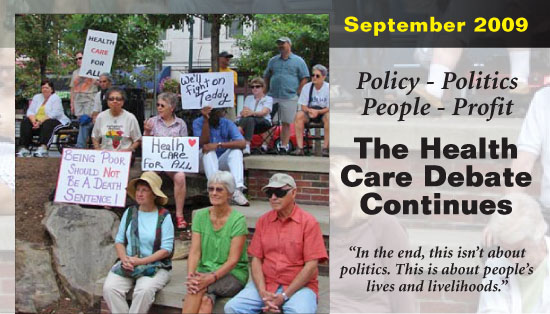Pulling the Plug on Grandma: Hijacking the Healthcare Reform Debate

by Michael Hopping
Republican Senator Charles Grassley was supposed to be negotiating a bipartisan solution to our nation’s healthcare crisis.
That was before he aligned himself with Sarah Palin’s outrageous falsehood about “death panels” in reform legislation. According to an August 15 Des Moines (IA) Register story, “There is some fear,” Grassley said during a town hall forum, “because in the House bill, there is counseling for end of life. And from that standpoint, you have every right to fear.”
Days later an elderly speaker at another Grassley forum referred to President Obama as a little Hitler and said he’d take a gun to Washington if enough others did too. According to the Iowa Independent, Grassley allowed the comment to pass. In Redding, California, Rep. Wally Herger replied to a self-described “proud right-wing terrorist” by praising the man as a great American.
Political warfare
Since Theodore Roosevelt proposed national health insurance as the Bull
Moose candidate for president in 1912, Republicans have opposed
government involvement in health care. President Truman’s postwar plan
for a nationalized system went down to defeat.
In 1961 the American Medical Association (AMA), fearing what would
become Medicare, hired Ronald Reagan to rail against the evils of
President John F. Kennedy’s “socialized medicine.” Republicans beat
back reforms proposed by Senator Ted Kennedy during the Nixon
administration and later attempts by Presidents Carter and Clinton. Now
the party has again allied itself with groups bent on preventing a
system overhaul.
As The Urban News reported in June, the health insurance industry says
it is in favor of healthcare reform. UnitedHealth Group and other
insurers claim to support a government mandate that everyone buy health
insurance, but only without a public plan.
Recognizing that a public
option would cut into their customer base, UnitedHealth recently sent
employees a letter encouraging them to oppose it. A UnitedHealth
customer who called a number listed for information was referred to
events sponsored by the Tea Party movement and America’s Independent
Party.
Several allegedly grassroots conservative groups have joined the fight.
The new US Citizens Association decries “socialized medicine.”
Conservatives for Patient’s Rights is an industry front group openly
opposed to reform and supportive of town hall protests. It is headed by
Rick Scott, the former CEO of Columbia/HCA, a private hospital chain,
who was ousted in 1997 after a federal investigation produced 14 felony
convictions and $1.7 billion in fines for defrauding Medicare.
FreedomWorks, the instigator of Tea Party Patriots and town hall
protests, has a history of financial ties to industries aided by its
activities and is headed by former Republican House Majority Leader
Dick Armey. FreedomWorks volunteer Bob MacGuffie is credited with
drafting the tactical template for disruptive town hall protests.
Another group, Americans for Prosperity, sponsors anti-healthcare
reform events, including a rally held in Asheville August 3. Its major
funding sources include ExxonMobil and the Koch Family Foundations.
ExxonMobil has challenged the science of global climate change studies
for many years, and the Koch family were among the founders of the John
Birch Society, a group dedicated to fighting communism, the federal
income tax, and civil rights legislation. ExxonMobil also funded the
Sixty Plus Association, a group that bills itself as the conservative
alternative the AARP and runs TV ads falsely suggesting that proposed
reforms would cut Medicare benefits for seniors.
Democrats and liberals have responded with massive campaigns of their
own. President Obama’s volunteer network, Organizing for America,
supports the president with petitions, town hall talking points, and
neighborhood canvasses. It will back Obama regardless of what
provisions a final bill contains.
MoveOn, a progressive organization unaffiliated with the Obama
campaign, is more insistent that the final bill retain a public
insurance option. Investor George Soros, one of very few progressives
with a billionaire’s deep pockets, was an early contributor to MoveOn.
Both organizations have held events in Asheville, as has the local
grassroots group, Life O’ Mike, which advocates for coverage of the
uninsured.
AARP, the AMA, and American Nurses Association all favor significant
reform, at least in principle. Some unions, including Service Employees
International Union (SEIU), encourage members to support the Democrats.
Scuffles between union members and anti-reform activists have occurred
at town halls.
Yelling “Fire!”
The pro-reform camp has sought to build its case on facts, figures, and
personal stories about the failings of the current healthcare system.
Opposition groups are fighting something closer to a guerrilla war,
with the stated plan of stalling legislation until they can kill it.
• At FreedomWorks, Dick Armey sent a letter telling volunteers, “The
Speaker of the House, Nancy Pelosi (D-CA) stated recently that ‘I am
not afraid of August. It’s just a month.’ It may be true that August is
just a month, but it’s also true that the longer we have to expose the
real intentions and the economic ramifications of the Cap and Tax and
health care reform legislation on the table, the more afraid Ms.
Pelosi, Senator Reid, and President Obama should be.”
• Late in August the Republican National Committee sent prospective
donors a questionnaire implying that Democrats may use voter
registration information to deny healthcare to Republicans.
• Conservative television host Glenn Beck and others suggest healthcare
reform is a socialist – i.e., far left-wing – plot, while his radio
colleague Rush Limbaugh compares the Obama administration to Nazis –
i.e., far right totalitarians. Anti-Obama activists have recently
appeared outside presidential town hall gatherings
Advance Planning
Meanwhile, blatant falsehoods about cuts to Medicare benefits, “death
panels,” “death books,” and euthanasia are used to terrify the
uninformed. Grassley and other Republicans used to favor allowing
physicians to bill Medicare for helping patients draw up living wills.
George H. W. Bush was president when hospitals were first required to
assist patients with them.
That is the purpose of the ten-year-old Veterans Administration
workbook, Your Life, Your Choices: to help veterans make their wishes
known about end-of-life care. Options range from “My life should be
prolonged as long as it can, no matter what its quality, and using any
means possible,” to “I’d want my religious advisers to be consulted
about all medical decisions made on my behalf to make sure they are in
keeping with my religious teachings,” to “I believe there are some
situations in which I would not want treatments to keep me alive.” Thus
the patient, not anyone else, expresses what he or she wants, rather
than leaving physicians, health insurance bureaucrats, or family
members to guess.
The VA makes several living will tools available to vets, and the
so-called “death book” wasn’t controversial until a Wall St. Journal
op-ed by Jim Towey suggested that the VA is using the free workbook to
encourage vets to “unplug” themselves. But Towey’s interest is personal
as well as political: he tried to get the VA to buy his competing
workbook, “Five Wishes,” for $5 a copy, and the VA declined.
Honest research
Medical research comparing the effectiveness of treatments was long
funded by sources without a direct stake in the outcome. But federal
cutbacks beginning in the 1970s led medical schools to depend on grants
from drug companies and others with a vested interest in the research.
Pay-to-play studies are the result. Marketing takes precedence over
determining which treatment strategies actually work best for patients.
As Atul Gawande reported in The New Yorker, expensive variations in
medical practice have arisen between doctors in different towns, but
costly procedures don’t ensure better health outcomes.
The Obama administration supports restoring unbiased, government-funded
comparative effectiveness research which, as asserted in a 2009
Institute of Medicine report entitled “Comparative Effectiveness
Research,” is designed to determine the relative medical value of
different treatments in different circumstances, not the worthiness of
patients for treatment. But reform opponents still claim that the
government wants to deny care to old and disabled people.
Republican Party Chairman Michael Steele’s positions on Medicare set a
new standard for cynicism. He proposes a “Seniors’ Healthcare Bill of
Rights” that would prevent any Medicare-related money from funding
reform, but he describes Medicare as bankrupt and inept. “Government
cannot run a health care system. They’ve already shown that. Trust the
private markets to do it the right way.” In other words, “Medicare is a
total failure. Don’t touch my Medicare!”
Real questions
The fearmongering, baseless allegations, posturing, and partisanship
have obscured legitimate questions about how best to proceed with
healthcare reform. These center on cost containment, financing, and
what to do about the uninsured.
National single-payer healthcare systems around the world provide
universal coverage and higher degrees of public health at far lower
cost than ours. Savings come from great bargaining power and
standardization of both benefits and paperwork.
Republicans, some
conservative Democrats, and insurance companies have prevented serious
consideration of single-payer plans this year.
A publicly funded insurance option, something like Medicare that people
could choose to buy into, still retains a bit of bargaining power.
Proposals for multiple non-profit co-ops give up even that advantage.
Without a strong public option, mandates forcing people to purchase
health insurance would feed more dollars into private insurance
companies, that are free to raise premiums and reduce benefits at will.
The financing and budgetary impact of a public option remain unclear,
in part because no unified bill has emerged. Reflecting conservatives’
newfound concerns about balanced budgets, Sen. Joseph Lieberman (I, CT)
has suggested that the uninsured may have to wait “until the recession
is over.” Obama proposes to raise a third of the money needed to pay
for HR 3200 by capping the itemized deduction rate for the wealthiest
Americans at 28%. He’d get the other two thirds from savings, largely
from Medicare. Benefits would stay the same, but some payments to
providers would be cut. He’d also end some federal subsidies to private
insurance companies. This could indirectly raise costs for seniors with
Medicare Advantage insurance plans.
Contrary to another false anti-reform charge, HR 3200 doesn’t provide
for the coverage of illegal immigrants. Nor does any plan with a chance
of passage provide universal coverage for Americans. The number of
currently uninsured people actually added to insurance rolls would
depend on choices about public options, co-ops, mandates, and subsidy
levels that have yet to be determined.
What to make of it all
The healthcare reform debate has been hijacked by people and
organizations intent on using it to advance other agendas: supporting
Obama, breaking Obama, or more broadly breaking the power of federal
government as the followers of the radical right have long sought to do.
Healthcare and energy legislation are key elements of America’s future.
They deserve sober debate among adults, not pitchforks and circuses.








